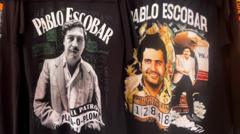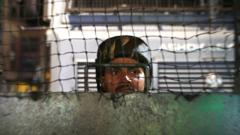A bill to ban Pablo Escobar memorabilia in Colombia is stirring controversy, with some supporting the law as a step towards healing and others worrying about its effects on local businesses. Advocates argue that Escobar's glorification hinders the country's progress, while vendors defend their livelihoods and the role of souvenirs in tourism.
Colombia's Controversial Effort to Ban Pablo Escobar Memorabilia Sparks Diverse Reactions

Colombia's Controversial Effort to Ban Pablo Escobar Memorabilia Sparks Diverse Reactions
A proposed law in Colombia's Congress aims to prohibit the sale of merchandise celebrating drug lord Pablo Escobar, igniting debates about his legacy and the impact on local vendors.
A proposed legislative measure in Colombia is seeking to ban the sale of Pablo Escobar memorabilia, leading to a divided public response in a country still grappling with the notorious drug lord's legacy. On 27 November 1989, a plane crash orchestrated by Escobar's cartel resulted in the deaths of 107 passengers, including Gonzalo Rojas's father. This tragic event left a profound mark on Rojas, who recalls his heartbreaking memories from that fateful day.
Despite Escobar's death in 1993, his image continues to thrive, fueled by popular culture and the commercialization of his legacy, including items like mugs and T-shirts sold to tourists. The proposed law aims to eliminate such merchandise in an effort to curb the glorification of a man responsible for thousands of killings and significant damage to Colombia's reputation on the global stage.
Juan Sebastián Gómez, a congress member associated with the bill, stressed that crimes of this magnitude should not be trivialized through consumer goods. The law would entail fines for violations and temporarily suspend businesses that continue to capitalize on Escobar's image. However, many local vendors argue that the ban threatens their livelihoods. Joana Montoya, who owns a souvenir stall in Medellín, claims at least 15% of her sales depend on Escobar-themed products.
Evolving from its past as a crime-ridden locale, Medellín has transformed into an inviting city for tourists. Nevertheless, many citizens still fear the residual effects of trafficking culture; some believe banning the merchandise is less about erasing history and more about diminishing the mythical glorification of Escobar. Rojas, who is involved in changing narratives around drug trade, sees the bill as pivotal yet believes it lacks an educational focus that could inform future generations about their history.
As the bill continues to make its way through Congress, advocates hope it will ignite a larger conversation about how Colombia remembers its past. Medellín's mayor has backed the bill, labeling the merchandise an insult to both victims and the city itself. This complex debate encompasses socioeconomic issues, national identity, and the harrowing legacy of violence — all still echoed in the fabric of Colombian society today.





















